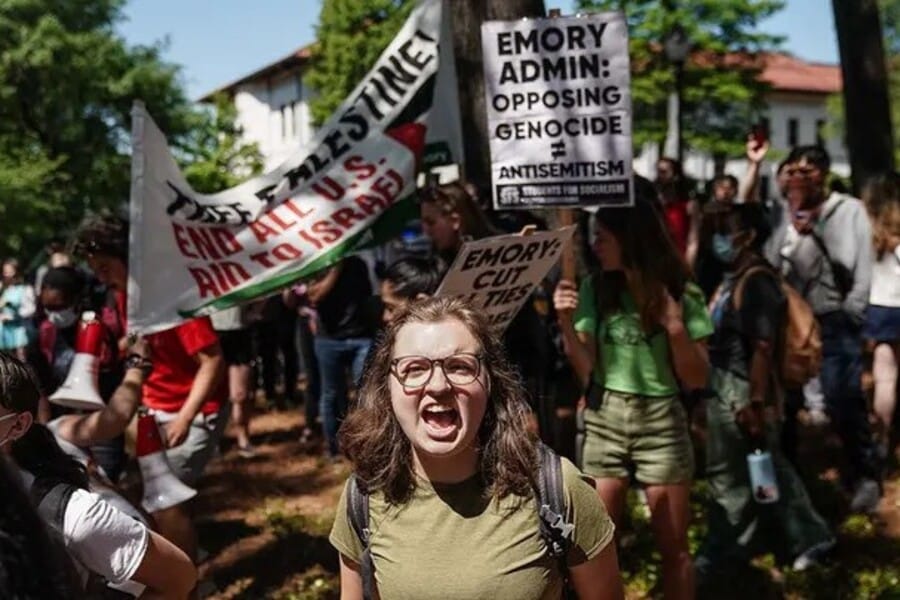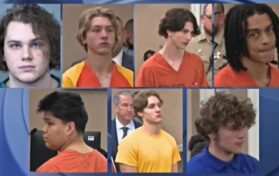
Universities across the United States are facing a pressing issue during anti-Israel protests: the frequent participation of individuals who have no ties to their academic communities. This infiltration by outsiders not only complicates the management of these demonstrations but also raises significant concerns regarding their motives and the potential risks to campus security and student safety.
At Emory University in Atlanta, this issue came to the forefront during a protest initially intended as a peaceful campus gathering.
The demonstration coincided with the setup for a commencement ceremony, a time typically marked by celebration and unity. However, the atmosphere quickly shifted as 28 individuals were arrested, eight of whom were identified as not affiliated with the university.
This incident disrupted the event and heightened tensions on campus. Cheryl Elliott, Vice President of Public Safety at Emory, noted that some demonstrators aggressively bypassed campus police, set up tents, and adamantly refused to vacate the premises, compelling the university to call in additional law enforcement support.
This response was necessary to regain control and ensure the safety of the university community, underscoring the challenges universities face when external elements covertly embed themselves in student-led protests.
This pattern is not isolated. George Washington University also reported disruptions at its anti-Israel protests, with officials confirming that several participants were not university affiliates. This led to increased security measures to prevent outsiders from accessing significant campus areas like the University Yard.
Ohio State University faced a similar challenge. During a two-day operation to dismantle an anti-Israel encampment, police arrested nearly 40 people, fewer than half of whom were students. The University of Texas at Austin echoed this, stating that many of those arrested at their protests were not linked to the university, suggesting the involvement of external groups aiming to cause disruptions.
Northeastern University in Boston dealt with a severe incident where a student demonstration was hijacked by professional organizers with no ties to the university. The situation deteriorated when these infiltrators used deeply offensive antisemitic slurs, prompting an immediate response from the university to clear the encampment and address the hate speech, as reported by Renata Nyul, Vice President for Communications.
Columbia University in New York also suffered from the intrusion of outsiders into student-led protests, leading to encampments and the propagation of anti-Jewish rhetoric. Columbia’s President, Nemat “Minouche” Shafik, expressed her dismay at the divisiveness caused by these actions and outlined the university’s steps to strengthen security and rebuild community unity.
Despite repeated attempts by Fox News Digital to contact other institutions like Yale, New York University, Harvard, and the University of Southern California for comments on such protests, responses were not forthcoming. However, the New York City Police Department has recognized the trend of outsider involvement, especially at Columbia University, noting that these groups often intensify conflicts and incite further disturbances.
NYPD Deputy Commissioner Kaz Daughtry highlighted the department’s commitment to supporting peaceful protests while also stating their readiness to intervene more directly should university administrations allow. Daughtry’s statement underscores a broader law enforcement perspective focused on maintaining order while respecting the right to assembly.
The recurring involvement of outsiders in campus protests presents a complex challenge for universities trying to balance the right to free speech and assembly with the need to ensure campus safety. This situation necessitates a sophisticated approach to campus security, capable of distinguishing between legitimate student activism and the potentially disruptive actions of external actors.
As universities continue to navigate these complex situations, they remain vigilant in their efforts to protect their educational missions and ensure that their campuses remain environments conducive to learning and free expression. The ongoing issues highlight the importance of strategic security measures and the need for universities to adapt continually to the evolving dynamics of campus protests.
This balancing act is crucial not only for maintaining order but also for protecting the rights of students and staff, ensuring that campuses are safe spaces where intellectual engagement and expression are encouraged and protected. The challenge lies in effectively managing these protests in a way that respects the rights of all parties involved and prevents the escalation of conflicts fueled by individuals with no genuine ties to the university community.
As universities across the U.S. face these challenges, their administrations must ensure that campuses remain centers of education and debate, not conflict zones influenced by external agitators.
The evolving nature of campus protests, with their blend of local and external participants, demands continuous vigilance and strategic adaptation from university authorities. They must navigate the delicate balance between upholding free expression—a foundational pillar of academic life—and ensuring campus safety.
This task requires a nuanced understanding of the dynamics at play, including recognizing the legitimate concerns of students and distinguishing them from potentially disruptive outside influences.
Effective management of this balance is essential not only for maintaining order but also for fostering an environment where open dialogue and academic freedom thrive. As such, university policies and responses must be constantly evaluated and updated in response to these ongoing and complex situations.





